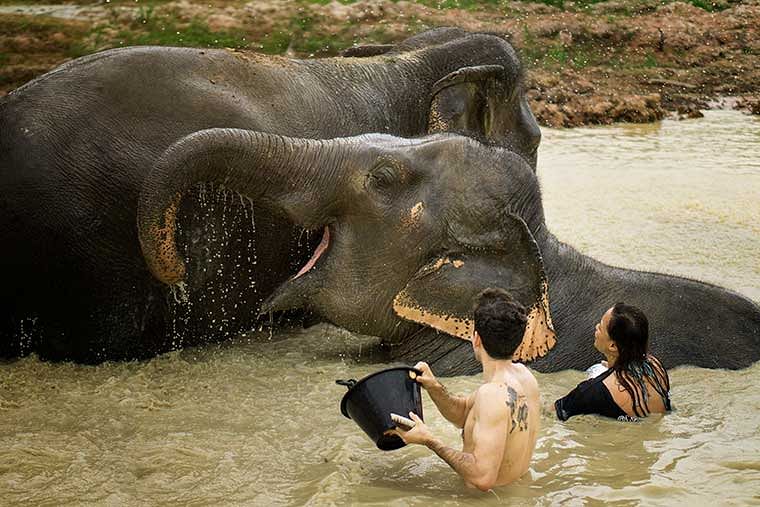Chiang Mai Things To Do
Frequently
Asked
Questions
Chiang Mai, often regarded as the spiritual capital of Thailand, is home to many ancient and revered temples. Some of the most iconic ones include Wat Phra Singh, known for its golden structures and lion Buddha image; Wat Chedi Luang, distinguished by its large stupa; and Wat Suan Dok, where ashes of Chiang Mai's royal family are kept.
Each temple has its unique architecture and history, making them prime destinations for those seeking cultural immersion.
Doi Suthep Temple, officially known as Wat Phra That Doi Suthep, is a revered temple located atop Doi Suthep mountain. To reach it, visitors can either take a red truck (songthaew) from the city, rent a motorbike, or even hike up the mountain.
Once at the base, there are also the famous 306 steps leading to the temple, offering a rewarding view and spiritual experience.
Ethical treatment of elephants has become a significant concern for many travelers to Thailand. Mae Sa Elephant Camp has long been a famous destination for tourists seeking elephant encounters. However, as with all animal attractions, it's crucial to research and assess whether the camp aligns with your ethical values.
It's always recommended to support camps or sanctuaries that prioritize the health, well-being, and natural behaviors of the elephants.
Absolutely! Chiang Mai is renowned for its culinary heritage and offers numerous traditional Thai cooking classes. These classes often include market tours, where participants can source fresh ingredients, followed by hands-on cooking sessions.
It's a fantastic way to immerse oneself in Thai culture and return home with some delectable recipes under your belt.
The Night Bazaar in Chiang Mai is a bustling marketplace that operates in the evenings. It boasts a wide variety of stalls selling everything from handicrafts, souvenirs, and clothing to delicious street food.
While some might find it touristy, many visitors enjoy the atmosphere, the bargaining, and the myriad of items available for purchase.
Chiang Mai's strategic location offers a gateway to numerous day trip destinations. Popular options include the Doi Inthanon National Park, home to Thailand's highest peak; the White Temple (Wat Rong Khun) in Chiang Rai, an avant-garde interpretation of Buddhist architecture; and the Sticky Waterfalls (Bua Tong), unique for its 'climbable' limestone layers.
Each site offers a unique experience, from nature excursions to cultural explorations.
The Yi Peng Lantern Festival, one of Thailand's most iconic events, is celebrated in November. The exact date varies as it's based on the Lanna lunar calendar. It's characterized by thousands of lanterns released into the night sky, symbolizing letting go of all ills and misfortunes.
Being a significant event, it attracts many visitors, so it's advisable to book accommodations and transport in advance.
Yes, Chiang Mai offers a variety of trekking tours that emphasize ethical interactions. Ethical tours are those that ensure respectful and sustainable interactions with hill tribes, wildlife, and the environment.
When choosing a tour, it's essential to research and opt for operators that have transparent practices and prioritize the well-being of local communities and nature.
Experiencing Lanna culture is integral to a Chiang Mai visit. Activities like attending a traditional Khantoke dinner, where diners sit on the floor and enjoy a variety of northern dishes, offer a genuine glimpse into the culture. Additionally, visiting local workshops, participating in festivals, or even taking a traditional dance or music class can further enrich the experience.
Lanna culture is deeply rooted in the arts, rituals, and daily life of the northern Thai people, making Chiang Mai the perfect place to immerse oneself.
Chiang Mai is widely considered a safe destination for solo travelers. Thai people are often described as friendly and hospitable towards tourists. However, as with any travel destination, it's essential to exercise common-sense safety precautions.
This includes not leaving belongings unattended, avoiding poorly lit areas late at night, and using reputable transport options.
